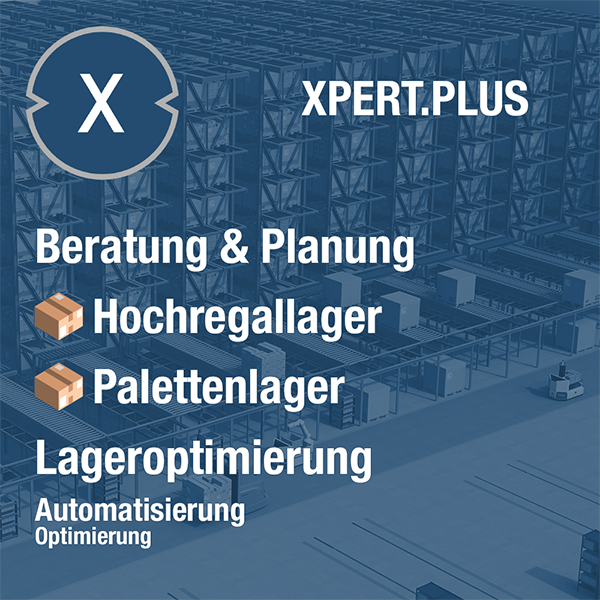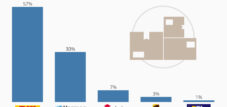The Hermes drama: A German logistics giant fights for survival – Fatal mistakes and missed opportunities
Xpert pre-release
Language selection 📢
Published on: September 22, 2025 / Updated on: September 22, 2025 – Author: Konrad Wolfenstein

The Hermes drama: A German logistics giant fights for survival – Fatal errors and missed opportunities – Creative image: Xpert.Digital
Rise and fall of the logistics company Hermes
From parcel pioneer to restructuring case: The dramatic story of Hermes' decline
For years, the name Hermes was synonymous with parcel delivery in Germany, a familiar sight on countless doorsteps, and often praised as a test winner by Stiftung Warentest. But behind the facade of this former industry pioneer lies a company in a deep, existential crisis. Founded in 1972 as an innovative alternative to the slow German Federal Postal Service and a pioneer in services such as returns collection, the logistics giant is now struggling with the consequences of fatal strategic decisions, neglected digitalization, and a grueling price war. The situation is so dramatic that the parent company, the Otto Group, has written down Hermes Germany's value to zero euros in its consolidated financial statements – an unprecedented collapse. This analysis traces the path from emerging challenger to crisis, uncovers the crucial mistakes, and illuminates why the Hermes case is far more than just the story of one company, but a symptom of the profound challenges facing the entire German economy.
How did Hermes' success story begin?
The story of Hermes begins in 1972 with a strategic vision from Otto Versand. As early as the late 1960s, an investigation by the mail-order association had uncovered serious deficiencies at the German Federal Postal Service: The state-run postal service was considered too slow, too unreliable, and too costly. These findings did not go unnoticed by entrepreneur Werner Otto.
After a planning phase lasting approximately five years, during which Otto Versand developed and tested a postal-independent parcel distribution system across multiple levels, Hermes Paket-Schnell-Dienst GmbH & Co. KG was founded on June 1, 1972. The partners were Otto Versand with a 70 percent stake and Werner Velbinger with a 30 percent stake. Velbinger contributed his "Parcel Service" division to the Werner Velbinger Organization, which was already one of the leading private delivery companies.
The alternative to the state-owned monopoly quickly established itself. Just six months after its founding, Hermes had 20 branches in Germany. The business model was designed to offer Otto Versand customers a better delivery service than was possible through the then-German Federal Post Office.
Which innovations shaped the early years?
From the very beginning, Hermes distinguished itself through innovative approaches that would later become the standard in the industry. In 1973, Hermes vehicles were converted to enable the particularly gentle delivery of outerwear as "hanging garments." This delivery flexibility quickly paid off: During the 1973 Christmas season, Hermes delivered its one-millionth shipment.
Another milestone was the early introduction of returns collection as an integral part of the Hermes service. This service, now taken for granted, was revolutionary at the time and significantly supported the growth of the mail-order business. In 1975, just three years after its founding, Hermes had a nationwide presence in Germany and, with approximately 560 employees, managed the entire shipment volume of Otto Versand.
The first major expansion steps took place in the 1970s. In 1976, Schwab became the first subsidiary of Otto Versand to contract with Hermes Versand, increasing shipment volume by almost five million to 16.2 million shipments per year.
How did the expansion proceed in the 1980s and 1990s?
The 1980s marked a period of continuous professionalization. In 1986, Otto became the first mail-order company in Germany to introduce a 48-hour express service, implemented by Hermes. German reunification marked a historic moment: After the currency changeover on July 1, 1990, the Hermes Express Parcel Service was the first parcel service capable of delivering to customers nationwide in the former GDR.
The expansion was primarily achieved through the newly founded Hermes Versand Service Berlin GmbH, a temporary branch in Coburg, and five new cooperative branches. This rapid response to the political changes gave Hermes a decisive competitive advantage in the German market.
In 1992, in its 20th year of existence, Hermes delivered its 500 millionth shipment. The number of depots increased to 64, and important technical innovations such as the introduction of the one-day cycle and Hermes' proprietary cell coding facilitated the development of the courier system in 1995.
When did digitalization and modernization begin?
The turn of the millennium brought further important developments. On February 1, 1999, the first Hermes ParcelShop opened, a concept that would later become one of the company's most important pillars. In 2002, Hermes celebrated its 30th anniversary with approximately 4,000 employees, 10,000 delivery partners, and over 5,000 ParcelShops.
In 2003, the various Hermes companies were consolidated under the umbrella brand "Hermes Logistik Gruppe." In November of the same year, the service was expanded to include private parcel delivery in stores. International expansion began in 2006 with the delivery of private parcels to EU countries and continued in 2007 with the founding of Hermes Logistik GmbH Austria.
In 2009, the Hermes Logistics Group became Hermes Europe. That year, the company achieved revenue of €840 million and handled 266 million shipments. Continuous expansion meant that Hermes already had over 14,000 collection points in German retail.
What role did technological development play?
Hermes recognized the importance of technological innovations early on. In 2010, with ten electric vehicles in its own fleet, the company was among the world's first to use electric vehicles in the CEP industry. With the launch of the logo-brand WE DO!, the company highlighted its extensive environmental commitment, which had already reduced CO2 emissions per shipment by almost 40 percent.
As part of its expansion within Germany, HLGD began construction of a new main transshipment base in Hanover-Langenhagen, in which approximately €35 million was invested. At the same time, the new Hermes II office complex in Hamburg was completed, with an investment of €18 million.
In 2016, the two companies Hermes Logistik Gruppe Deutschland GmbH and Hermes Transport Logistics GmbH were merged to form the current Hermes Germany GmbH. As part of a future and innovation program, the location structure throughout Germany was restructured between 2016 and 2020.
When did the first problems begin?
Despite the apparent success, the first structural problems became apparent as early as the 2010s. Working conditions in parcel delivery came under increasing criticism. In 2015, a report by Günter Wallraff about rude business practices at GLS caused a stir, and Hermes also came under scrutiny for similar problems.
In 2017, media reported on the "Hermes system" and its dependence on subcontractors. In Neuenkirchen near Osnabrück, journalists encountered young Romanians who, in some months, earned less than four euros an hour despite working as parcel deliverers for Hermes. Although Hermes has been the first and so far only major logistics company in Germany to operate a comprehensive audit and certification system since 2012, such cases demonstrated the limits of control over subcontractors.
The structural problems were exacerbated by the business structure. A former Hermes subcontractor admitted: "It simply wasn't financially viable; I couldn't have paid more, even if I wanted to. I was already at my limit, barely able to live on." His allegation: Although Hermes demanded the minimum wage from its subcontractors, the amount paid per parcel wasn't enough to cover it.
What impact did the coronavirus pandemic have?
The coronavirus pandemic initially brought an enormous boom to the entire parcel industry. In 2021, the sector reached a record volume of 4.5 billion shipments. High capacity utilization led to rising hourly wages above the legally mandated minimum wage, and delivery services still made decent profits.
Hermes benefited from this boom, temporarily reaching historic highs. In the 2019/20 financial year, the Hermes companies in Germany and the UK transported over 760 million shipments. Due to the pandemic, both companies experienced significant volume growth, leading to an expansion of personnel capacity.
However, this seemingly positive development masked structural weaknesses. In the 2020/21 financial year, Advent International acquired 25 percent of the shares in Hermes Germany GmbH and 75 percent of the shares in Hermes Parcelnet Limited in the UK. The Otto Group was forced to seek an external partner to tap into further growth potential in this highly competitive business segment.
Who benefits from the decline? Opportunities for DHL, DPD, and others.
What strategic mistakes led to the decline?
Hermes made several crucial strategic mistakes that contributed to its current decline. While competitors like DPD, GLS, and UPS cleverly focused on business customers, Hermes focused primarily on private customers. This focus proved disastrous, as deliveries to households often require multiple attempts, while business customers can be reliably reached.
Another serious mistake was the lack of digitalization. Hermes is considered the least digitized delivery service in the industry. While a 2018 Hermes study on the digitalization of supply chains in the logistics industry was published, which showed that only eight percent of companies had a digitized supply chain, the company apparently failed to consistently apply these findings to its own business.
Dependence on subcontractors proved to be another structural problem. Hermes cooperates with around 330 subcontractors in Germany, who handle 90 to 95 percent of parcel deliveries daily. This structure not only led to problems with quality control and working conditions, but also to legal difficulties, as demonstrated by a 2025 British employment tribunal ruling that classified 15 courier drivers as employees rather than self-employed.
How dramatic is the current crisis?
Hermes' current crisis is unprecedented in the company's history. In the 2024/25 financial year, Hermes Germany closed with a net loss of €231 million on revenue of €1.6 billion. The previous year, the net loss was €63 million. The Otto Group has set the company's value to zero in its consolidated financial statements.
This dramatic deterioration is primarily due to declining parcel volumes. Online customers' reluctance to spend is causing order volumes and, consequently, parcel volumes to decline. The rule of thumb in the delivery industry is that a ten percent drop in parcels translates into a 50 percent drop in pre-tax profit, assuming the same network infrastructure. This rule is hitting Hermes hard.
The German parcel market shrank for the first time in nine years in 2023, and Hermes was the biggest loser in this decline. At the same time, rising energy costs and a fierce price war are weighing on the balance sheet. Among the five major competitors—Deutsche Post/DHL, DPD, GLS, UPS, and Hermes Germany—price increases are almost impossible to implement.
What measures are being taken?
Hermes is responding to the crisis with drastic cost-cutting measures. The parcel service is eliminating more than 700 jobs and outsourcing further activities to subcontractors. At the end of 2024, the parcel delivery company employed around 5,500 of its own staff, while approximately 10,000 delivery drivers worked through third-party companies. In the future, deliveries will be handled entirely by external drivers.
The impact on the remaining employees is dramatic. Drivers must deliver significantly more packages in a shorter timeframe. In Berlin, 200 deliveries a day are no longer uncommon. The Verdi union calls the agreed-upon social plan for job cuts a compromise, but doubts the motivation of the employees under these conditions.
The Otto Group's annual report states: "Significant risks still exist in the Services segment, particularly in logistics." In response, a restructuring program was approved at Hermes Germany in April. But then comes a warning: "Due to the persistently difficult market conditions, there is also a risk that the Otto Group may have to initiate new turnaround processes or closures."
Is there hope for rescue?
Rumors of a Hermes sale have been growing for years. Talks with DPD have been fruitless, and FedEx has also expressed interest but is committed elsewhere. A realistic candidate appears to be the Polish InPost Group, which already acquired Mondial Relay from the Otto Group.
Industry experts also suspect that Chinese online retailers such as Temu and Shein, in particular, could be interested in joining. "Online retailers from China are likely to be very interested in a German parcel service," emphasized industry expert Rico Back. Such a sale, however, would mean the end of the traditional German parcel service Hermes.
If a sale doesn't go through, further drastic cuts are looming. A withdrawal from rural areas is likely, while the focus would shift to profitable major cities. Hermes already cooperates closely with DHL and feeds shipments into its network—an admission of its own weakness.
How does Hermes compare to the competition?
Despite the current crisis, Hermes has certainly achieved success in the past. Hermes has been the test winner in several tests conducted by Stiftung Warentest, receiving top marks in 2004, 2010, and 2017. In 2017, Hermes was named test winner among parcel services by Stiftung Warentest for the third time, sharing a "good" (2.4) rating with another competitor.
In more recent tests, Hermes still performs respectably. In a large comparison test in 2025, Hermes was the surprise: fast and reliable in home delivery, albeit less popular with customers. In the speed test between Sylt and Tegernsee, Hermes was usually the fastest, closely followed by GLS.
In terms of market share, Hermes remains second behind DHL. Measured by parcel volume, DHL has a dominant market share of approximately 48-50 percent, followed by Hermes with approximately 15 percent. Interestingly, however, Hermes is only in fifth place in terms of revenue, behind UPS, DPD, and FedEx. This indicates the company's pricing weakness.
What does the Hermes case mean for the industry?
Hermes's decline is symptomatic of the challenges facing the German economy and the logistics industry. The crisis demonstrates how structural problems, strategic errors, and external factors can converge into a situation that threatens the company's existence.
The dependence on subcontractors, which had served as a cost-effective business model for years, proved to be a weakness in times of declining margins. The lack of digitalization and the focus on the price-sensitive residential customer segment exacerbated the problems. At the same time, rising energy costs, excessive bureaucracy, and intense competitive pressure revealed the limits of traditional business models.
For competitors, Hermes's weakness represents an opportunity to gain market share. DHL, with its near-monopoly position, is already benefiting from the redistribution of market share. Smaller providers like DPD and GLS can further strengthen their position in the business customer segment.
What lessons can be learned?
The Hermes case illustrates several important lessons for the modern logistics industry. First, it demonstrates the importance of a balanced customer base: The one-sided focus on private customers proved to be a strategic mistake, while competitors operated more successfully with a mix of private and business customers.
Second, the Hermes crisis highlights the need for continuous technological innovation. The company's lack of digitalization left it vulnerable to more efficient competitors. In an industry increasingly characterized by automation and data-driven processes, technological lag can quickly become a threat to its existence.
Third, the case highlights the risks of excessive reliance on subcontractors. While this structure may offer short-term cost advantages, it complicates quality control in the long term and leads to legal and reputational risks.
Fourth, it highlights the importance of a timely strategic realignment. Hermes failed to adapt to changing market conditions early on and only reacted when the crisis was already well underway.
What could the future look like?
Hermes' future remains uncertain. A sale to international investors or integration into an existing logistics network are the most likely scenarios. The days of the independent German parcel service Hermes appear to be numbered.
If the company were to survive as an independent brand, it would require a radical reorientation. This could include a stronger focus on profitable markets, massive investments in digitalization, and a fundamental overhaul of the subcontractor structure.
For the German logistics landscape, the disappearance of Hermes would mean further market concentration. DHL's dominance would further increase, while international providers could expand their position. This would impact pricing and the variety of services available to German consumers and businesses.
The Hermes case is a prime example of the transformation of the German economy. Traditional business models are coming under pressure as new, often international players conquer the market. Hermes' story—from innovative challenger to crisis-ridden restructuring case—reflects the challenges many German companies face in a globalized and digitalized economic world.
The coming months will show whether Hermes has a future as an independent company or whether the 52-year history of the German parcel service is coming to an end. One thing is certain, however: Hermes' era as a major player in the German parcel market is coming to an end, and with it, another piece of German corporate history is disappearing.

Xpert.Plus warehouse optimization - high-bay warehouses such as pallet warehouses consulting and planning
We are there for you - advice - planning - implementation - project management
☑️ SME support in strategy, consulting, planning and implementation
☑️ Creation or realignment of the digital strategy and digitalization
☑️ Expansion and optimization of international sales processes
☑️ Global & Digital B2B trading platforms
☑️ Pioneer Business Development
I would be happy to serve as your personal advisor.
You can contact me by filling out the contact form below or simply call me on +49 89 89 674 804 (Munich) .
I'm looking forward to our joint project.
Xpert.Digital - Konrad Wolfenstein
Xpert.Digital is a hub for industry with a focus on digitalization, mechanical engineering, logistics/intralogistics and photovoltaics.
With our 360° business development solution, we support well-known companies from new business to after sales.
Market intelligence, smarketing, marketing automation, content development, PR, mail campaigns, personalized social media and lead nurturing are part of our digital tools.
You can find out more at: www.xpert.digital - www.xpert.solar - www.xpert.plus

























